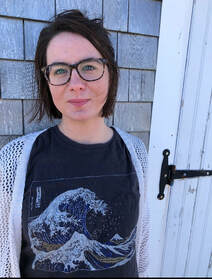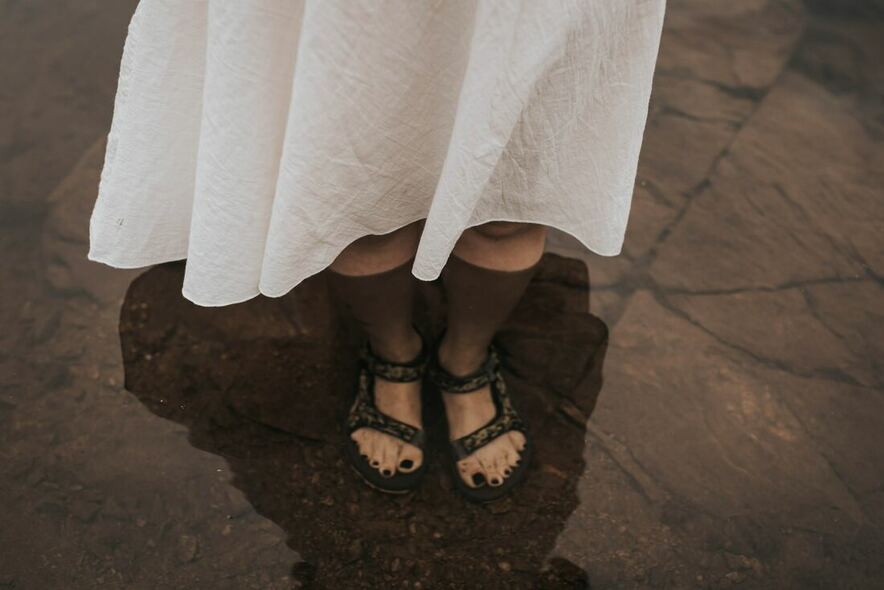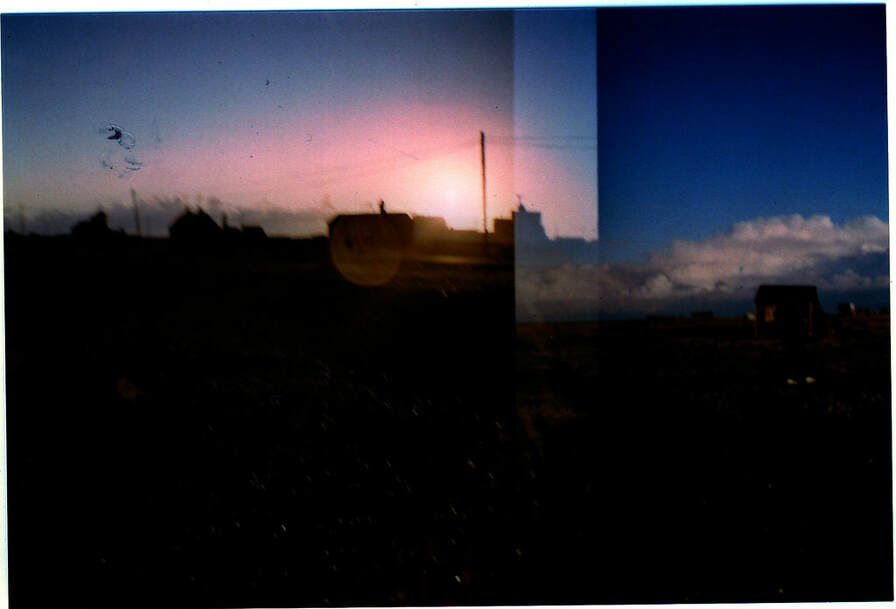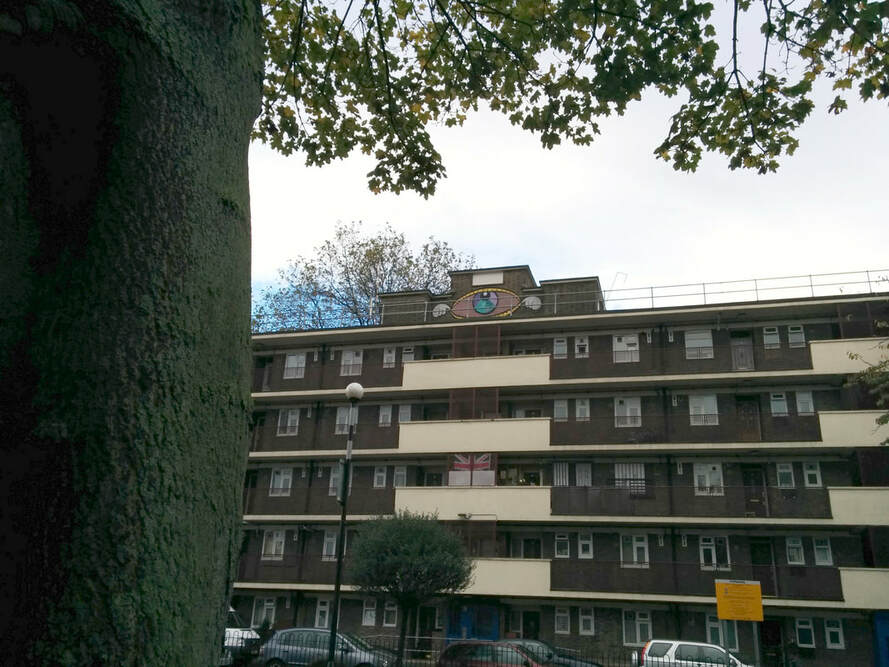|
Not Up for Discussion “Did you hear?” “I did, I’m sorry.” What haunts is not what I had told you then: A train-ride is eight hours long when it makes no stops until its destination. What haunts is that you trusted me. You don’t just cry in front of anyone. Boys don’t just cry in front of anyone. I didn’t put you onto drugs, (“I did, I’m sorry.”) but I’m the only man that you permitted to place the extracts of our evil flowers underneath your tongue (the same that I had once prescribed from my garage and high upon the hill where all the marigolds had bloomed but since were taken down). You’ve known me on the kitchen floor, discovering rainbows in the dishes and how Copernicus was thirty-two. All’s fair: you threw up twice inside my sink, another in my bath, and once, the carpet, that was never cleaned until I left that house and you within it. The next time, I promised that I’d walk you through it. The next time, The next time, The next “He’s out of our hands.” “Yeah. I’m done.” I don’t feel guilty. (I do.) A walkthrough is not a tomb. It is confession, but I am no guide, and what I gave was not communion: I told our brother that we never talked when I consoled him on the phone the Monday after. “You know how they say there’s a time before and a time after? I think I’ve just found the time after.” “Did you hear?” He said, she said. He did, he didn’t, he says he didn’t. She kissed 12 guys one night in Florida. She says she kissed 12 guys one night in Florida. We don’t talk about that. We don’t. We just don’t. “What did you do?” “I don’t remember. I promise.” We don’t talk about that. Was I supposed to know? Was it the time you pushed me to the floor, held me down, until my then-wife came and pushed you off? I laughed, put you to bed onto the mattress because your discomfort was second to mine. I’d rather believe you were a good person. let you fuck her one Friday in June. than admit I made a bad choice. (“I don’t remember. I promise.”) We didn’t see the leak until it was too late and all the air had vanished overnight. (“Yeah, I’m done.”) I drove you to the station in the morning. “This stays between us?” “I’m not gonna tell him we talked.” I promise you drugs. I never see you again. I don’t feel guilty. I do. I never see you again.  Adrian Belmes is a Jewish Ukrainian poet and book artist residing currently in San Diego. He is a senior editor for Fiction International, editor in chief of Badlung Press, and vice president of State Zine Collective. He has been previously published in SOFT CARTEL, Philosophical Idiot, and elsewhere. You can find him at adrianbelmes.com or @adrian_belmes. 4/3/2019 Editor's Remarks Susan Smith CC
"One wonders at the survival of tendrils and filaments of life in the unlived, almost invisible good in depths of desolation... Birth goes on all life long, yet we remain born-unborn, with the sense that our life is an incomplete moment. There are ways notions of "complete", "total", "whole" can be persecutory. There are many pleasures in a semi-born life, even if one is partly stuck in stone." -Michael Eigen I can only hope what we have built of this place over the years feels like a safe, intentional and healing space; like an old friend, when you're hurting, with his or her chair drawn close to yours. To mend is the destination. Yet contrary to the easiest of definitions; healing hurts. We don't always go from a state of broken to a place of whole. In fact many of us often find that we can go for decades without even feeling the pain of our many fractures. We disassociate like a first nature from the origin of our hurt, and find that discovering the locus of that pain can be, not just world shattering, but utterly disembodying. We need these bodies to make sense. And shutting out what we cannot digest is the only way of loving and of living sometimes. But we pay a price for putting off what we fail to feel authentically for a tomorrow that never comes. We have more moving parts than we know what to do with. Sometimes a capacity turns into an incapacity, what was just a moment ago brightly lit suddenly goes dark and vice a versa. The darkest measure of our lives finds its weird little dance partner in stuff we didn't always know much about; tenderness, love, mercy; not just words we had heard about but never really trusted, actual spaces we move in and out of. The whole aching deal is that it must all go together, what fits and what doesn't. A space can be terrifying when you don't know every corner of it, comforting when you think you do. We inhabit our bodies like stories, so sure that we've heard this one before, but, maybe not this chapter. We work through long periods of frustration before we can call forth from our great divide muted glimpses of what has been calling out to us all these years. We eventually feel understood not through grand gestures but through small happenings. The work that people most often bring us is just this; fragments of healing mixed with a whole lot of hurt. And so a space is always a bit of both; terror and comfort. This month our contributors broached the difficult topic of addiction and recovery in an abundance of courage and resolve. Some entrusted us with the first poems they had ever shared with anyone about growing up in dysfunctional, alcoholic households. Others with the very first poems they've ever showed anyone, period. That the space we've cultivated here has felt, not just safe, but like an invitation to share the most vulnerable stories, and to trust that these are in good hands, is not ever something I take lightly. I am continuously awed by what you've shown us of your difficult, necessary worlds. We began our project here at Anti-Heroin Chic with a rather difficult question; why the pain? Those that can still answer that, even in the form of a scream, are warriors of all that did not destroy them. Not that parts of us didn't in fact die along the way, but that more parts got through than we sometimes know what to do with. So many, many parts. As an intentional space I often feel we are practicing at the margins, yet everyone here contributes from the inside. Outside/inside. We're all here, together, in this space, for a moment. Sometimes a moment is enough. Creativity often means waiting for unknown emotional reality to build and to bud. We can be so brutal, to ourselves and to others, when we think we know. Including when we think we know what a space is. Or a body or a heart. What I have found most true in therapy I have found most true as an editor; that listening, holding space, is a sacred and risky endeavor. And when I think of what I gained from those who held those difficult spaces for me, I can only hope it is what those who've shared their work here might have found also; something essential in them believed. James Diaz Founding Editor Anti-Heroin Chic 4/3/2019 1981-2017 by Claudia Tesni1981-2017 Grief for you isn't a heavy silent ocean floor or a hellscape of arrhythmia, isn't swollen eyes, nerve pills, proper gravesites, isn't an ordeal of tears and knives. It's lost aching hallucinations and visions and screaming in my mind's eye It's a haunting, it's a poltergeist. __________ Part of me wants to be generous, like “how can I turn my back on decades of this?" This push and pull between tenseness, distance, diffidence, sisterliness But this body’s vengeance is brutal and gory It’s a near-death to remind you That you never claw your way out of your own story And I think I’ve gotten sick watching her write her own myths Like the truth is too stark and big – and it is. Finally, you’re toying with something of consequence Playing a losing game I wouldn’t play it, sis. __________ You can always back out Better for you that you catch hold of that fact And wear it quiet and close No one can keep you there Never let them know that you know.  Claudia Tesni has been writing poetry since childhood. She is a lifelong recluse, a visual artist, a naturalist, a guerilla gardener, and a forest janitor. She usually writes about isolation, dreamscapes, betrayal, and folk magic. Her visual art is somewhat available @ozomeneabominations on Instagram. Her poetry usually isn't available, but she's trying to be a bit less secretive about it. 4/3/2019 Featured Poet: Meaghan QuinnDetox After shitting for 3 days straight I double over at the methadone counter in an almost surrender. On my knees on my knees on my knees. In the shower I smoke. Now that the methadone protocol’s over my eyes bulge black. Hot rain crawls across my chest. When a patient hands me a decoy orange, there are two Clonidine underneath it. I swallow them both still rattling. Cannot stop bouncing my leg. Someone pop a movie in the DVD player. Someone skin me from myself. At the nurses station I pick up the phone to call the only God I’ve ever truly known and tell them I can’t do this. That I’m leaving my degrees and chalk behind. To live out of a backpack. With a man named after Ziggy Stardust. Every self-serving ounce of me believes I will do this. I remember little of the next few days, except that I left and his turtle sniffing around in a dry fish tank Ziggy and I ate pasta sopped Ragu sauce out of the pot in his basement drywall flaked around us was it his hands or my mouth I never came/come to one of us crying on the floor clutching our Insurance card The turtle tapped the glass as I blinked from sleep to dream reciting Hamlet’s soliloquy under my breath that most simple infinitive in the English language to be to be to be to be to be to be to be to be to be to be to be April in Treatment The chick with 3 amber dots in her eyes reads my birth chart, shakes her head, then blowing smoke in my face, she says matter of factly, “Ya, you’re on your last life.” This is how treatment begins. Part of me is haunted, the other climbs closer to the cosmos. I start to smell rain again and realize that you can’t really know rain until you’ve lost it. We blare Future and sprawl our limbs across the Adirondack chairs after chore time. A pregnant chick plays volleyball in the backyard, Newport 100 dangling from her mouth. I’ve never seen someone grin so wide. Come night I toss through the hours, drag the mattress into an old crib room -- branches scrape the window and I sweat in a set of matching pajamas. My roomie smuggles a ziplock of Folgers in her bra because she misses the pouch of dope that so often nestled against her nipple hidden and I identify. Over and over, I identify. I start eating food again. Walking the yard. Laughter comes. And joy, too. Addiction Imagine we are all here. All thirty-seven women outside on the lawn wildflower catching in our toes. We stand frozen, sealed in night’s haiku, an arm’s length apart under a volleyball net. The volley ball has rolled off to the side of the net, not one of us speaks or moves. Hot molasses scents the yard. We stand an arm’s length apart. No noise save the crinkle of blinking. We stand as in a game of Mother May I? Unsure of our next step or if one of us will pick up the ball. I fear walking off the lawn altogether. But I am stuck. Then the right hand of one of our Fathers floats across the lawn. He makes his way toward us and takes his right hand and with his right hand He taps each woman’s shoulder. After the tap some women stay standing but then one girl, then two, then seven, then twelve women lower, drop onto the lawn as slowly as rain falling from a lake. Those on the lawn sit crisscross applesauce. Their eyes stop blinking. Look around. How many still stand?  Meaghan Quinn is the author of Slow Dance, Bullets forthcoming from Route 7 Press. She holds an MFA from the Writing Seminars at Bennington College and has studied at The Fine Arts Work Center in Provincetown, MA. She has been nominated for Best New Poets and the Pushcart Prize and is a recipient of the Nancy Penn Holsenbeck Prize. Her poems have been published in Prairie Schooner, Impossible Archetype, Off the Coast, Heartwood, r.kv.r.y., 2River, Adrienne, Free State Review, and elsewhere. She resides on Cape Cod. 4/3/2019 Poetry by Daniel J. PizappiMost Things Die Too Soon, Living Takes Forever I’ve decided to forgive myself my birth. It was inevitable, accidental, and had so little to do with me. When I was young, as I was for so long, we kept chickens for eggs. Warm summer mornings I’d raid the coop then spend afternoons blinking sweat from my eyes, skipping to dodge their shit on the sidewalk. Most people never know what it means to eat the things they love. Back then I was the same. My mother bought meat boneless and skinless, so I learned to skin cellophane and styrofoam. It’s hard, almost impossible, to try to keep a flock alive when you don’t plan to eat it. Hard as it is to know which came first: the bloodstain or the egg. To catch one in the act of dying, cackling in a fox’s mouth, and try to act is to realize you don’t know how to save a thing. Still, I tried. Human, just another word for mistake. Sights on red fur I pulled the trigger to. The fox ran and yet, by tooth or by bullet, the hen didn’t breathe. Still Life with Memory and Forgetting When I was a child, we used to walk to a park not far from home. I don’t remember what it looked like-- I barely remember the house, I was so young when we moved —but I do remember the way the road curved downhill from our front yard into a wide horseshoe at the river’s edge, and how it curved back up on the other side. The park was up there somewhere, on that higher plane I no longer remember. The road in memory is a soundless, moving image. I do not appear in this image. There is no child holding his mother’s hand. There is no mother. There is no walking, no body. There is only the road, the vision floating above it, and the too-fast moving, curving blacktop-- smooth, as if filmed and stabilized, almost unnatural. When I die I will drift there, forever.  Daniel J. Pizappi lives in Knoxville, Tennessee. He is a PhD student, Managing Editor of Grist: A Literary Journal, and co-editor of the anthology Kentucky Writers: The Deus Loci and the Lyrical Landscape. His work has appeared or is forthcoming in Dark Marrow, Still: The Journal, The Mantle, and Your Impossible Voice, among others. Visit him at www.danielpizappi.com. Twitter: @DjPizappi 4/3/2019 Poetry by Kelsey Hoff emilyrachelmartin CC Please let me sit in the passenger seat Driving into the angle of light between school & dinner table, bible study & practice practice practice morning & afternoon, let me sing into the horizon. I get my share of looking at the back of someone else’s head. Take me anywhere but eight. Let me see businesses along the divided highway coming head-on & lit like a boulevard, the windshield a prism bending Midwestern sun into soft rock southern California. Folks passing through like Sheryl Crow rasping from the dashboard. I can hear promises of alternative routes to righteousness in collapsing clean rock rhythms, rollick over the dash into yellow-orange free association-- my body’s desire to trade this seatbelt for a guitar, but in the corner of my eye your hand moves from stick shift to volume. Double Solitaire Carol’s rings glittered & cracked beers, flicked ashes, flipped cards, chipped away at the deck three by three & my little hands mirrored hers. Ace to King & then shuffle again. Hand after hand the cards moved almost on their own, the sense of it I can still conjure: red & black counting down then shooting into divine order. I was twelve when she died & couldn’t ask anyone else for that kind of magick: edges flicking wood veneer table, talk that floated in smoke while the cards kept their own score. I practiced on my bedroom carpet with what she left me: a diamond ring, a deck of cards & a game I could play all alone. Please let me sit in the passenger seat Getting back into the truck with you, I’ll never be sucked in smoothly: a cassette gliding from soft fingertips to mechanical cradle for the hundredth time. Your new Chevy has automatic transmission, satellite radio. The back seat has grown leg room. No tiny feet swing into the cab ahead of your own, scuffing your interior. You tell me there are over a hundred stations, to put on whatever I want-- I still choose college rock. The only good timing I had in my life was acquiring my tastes when music & lyrics were backwards compatible with wisdom plucked from earthbound ugliness. When wooden instruments & voices rattled louder than a loose muffler. I’m tired & stiff from driving steady highways into blinding glare. Let me back into the cab ticking with rhythms I learned how to escape from, all the lyrics I knew without understanding. Turn the volume up like you did every time I started to sing.  Kelsey Hoff is a poet and freelance writer in Chicago, where she received her MFA in Poetry from Columbia College in 2017. She writes tarot poems for her collaborative blog project, Stinger & Fringe. Her poems are published in Columbia Poetry Review, Poets.org, Redheaded Stepchild, Hobo Camp Review, and elsewhere. Follow her on Twitter at @MidwestMadGirl. 4/3/2019 Yesterday's Donuts by Sasha Newbury Cory Doctorow CC
Yesterday’s Donuts So far south it feels like the end of the world, discarded ideals and beer-battered aspirations litter the shore line. Yesterday’s donuts sunbathe with tomorrow’s comedown – still warm and wet from penetration and washed away with Glen’s so far east the sun barely reaches, a town filled with aged people haunted by ever-present problems that linger at every shop door. You shall not pass without the guilt of privilege weighing – gently ebbing so far detached, this isn’t home anymore, not even the ghost of puberty past or rosy mist of reminiscence can fool me now - but I’m tethered anyway, to a town where yesterday’s newspaper gets printed with regret and fingered with greasy intent - where the self-perpetuating cycle starts at 15 with a broken condom on a dusty sofa at a shit party with your brother’s friend Dean – a town where empty souls roam the streets at the ripe age of 23. They’re starved of purpose - and dehydrated by the sea Sasha Newbury is a 24-year-old Copywriter living in London, originally from the not-so-sunny shores of Southend-on-Sea. She studied English Literature at Royal Holloway, University of London and despite desperately longing for - is still dogless. 4/3/2019 The Orphaned by Laura StringfellowThe Orphaned “I’m sorry to say we didn’t find something in this particular submission to fit just right for our forthcoming issue. This is not a reflection on the quality of your writing. Our tastes, admittedly, are quirky. Good luck finding a home for these.” Do poems have sizes to be changed at will, second-hand garments of the soul stitched thread by painful thread because we are too ashamed to speak, to feel the bite of grief, the sting of loss, the bruised heart beating in its cage. Don't we try to trim the sprawl of pain, the ugly bit of fat, the gruesome gristle, this inky business of life, culling the wild philodendra of our past into well-kept window boxes smiling toward the sun. Aren't they our children, these orphans, emissaries of the battered, neglected, the unspoken wounded, unsightly outcasts, crying out our misery for us in pain. Don't we make them speak our brokenness, make them fit, don't we line them up just right, hoping they will be adopted by some kindly and generous soul. Aren't we careful to make sure they are washed, scoured, rinsed, spun, softened, sanitized, shrunk, stretched, faded, fluffed, ordered, manicured, buffed, and polished, arranged, standing docile and expectant. And then, exhausted, don't we take them off at night, shake them out, close their twin halves like doors, button them down, fold and tuck them away, shut them up inside our dark, moth-eaten drawer of rejection.  Laura Stringfellow writes both verse and prose poetry, often exploring themes of transformation and woundedness. She is from the very humid Southern US, is passionate about protecting animals, and finds solace and healing in Nature. She holds an MFA in Creative Writing. 4/3/2019 atlanta falls by Katie Simpsonatlanta falls he calls my skin beautiful. like it is lace, or snow, or something not merely delicate, no, nothing so wide and strong as skin. his hand follows along my ribs, light to the touch, like my roommate’s cat along my comforter, uncertain of the terrain, of what will carry of what will sink beneath his paw. as he touches me, i find myself gingerly reaching out to him despite my own uncertainty, the tenderness of skin and bone and the steady gravity that holds bodies together. how can i forget our impermanence? i hide in my laugh, large and bright. call me atlanta. i remember the boar and the blood on my hands. still i touch him, letting my breasts fall forward, golden apples. i hold the night’s empty promises, the dawn’s hard reality alone again. and the roar of hunger and frustration beginning from my gut. hidden in candlelight, still i let him stay. after all, beneath a new moon, can the bitter gods see us? can their old ways trample something so fresh, so new? he calls my skin beautiful. and i think of lace, of something so delicate, it couldn’t be me. turn off the lights. we are still so far from ending.  Katie Simpson is a writer and photographer based in San Francisco. Her work has been featured in Quiet Lightning, HitRecord's Body Book, and Entropy Magazine. When not writing, she loves traveling and people watching. You can find her online at: https://twitter.com/honest_creative. 4/3/2019 Poetry Delvon T. MattinglyDependence During a pandemic of gloom, a star shines capriciously, and for most people, the sun will one day fail to rise; but for you, that day comes often as you walk on glass fragments, rivulets of blood milking your soul—a pool of poison gripping your ankles. Desiccated down to hollow bones, your fluids find new residence in a familiar void, and a parchedness complements an insatiable hunger, as you’re more and more willing to drink the poison. Wanderlust I had a dream that we climbed lighthouses to gaze upon fields full of sunflowers, the fringes of their petals glistening under a setting crimson sun. Realizing the very veracity keeping us apart, lies in an inability to dream again. Limbo My mind falls numb before my body ceases to jitter, and I often dream, very briefly, that I’m treading every line between the ethereal and the corporeal, searching for a crossing, to scream at the deities governing this world, as well as myself, for living in it.  Delvon T. Mattingly, who also goes by D.T. Mattingly, is a writer from Louisville, Kentucky and a PhD student in epidemiology at the University of Michigan. His short fiction and poetry have appeared or is forthcoming in Maudlin House, Jellyfish Review, Star 82 Review, and elsewhere. He currently lives in Ann Arbor, Michigan with his two cats, Liam and Tsuki. Learn more about his work at http://delvonmattingly.com/ |
AuthorWrite something about yourself. No need to be fancy, just an overview. Archives
April 2024
Categories |










 RSS Feed
RSS Feed
